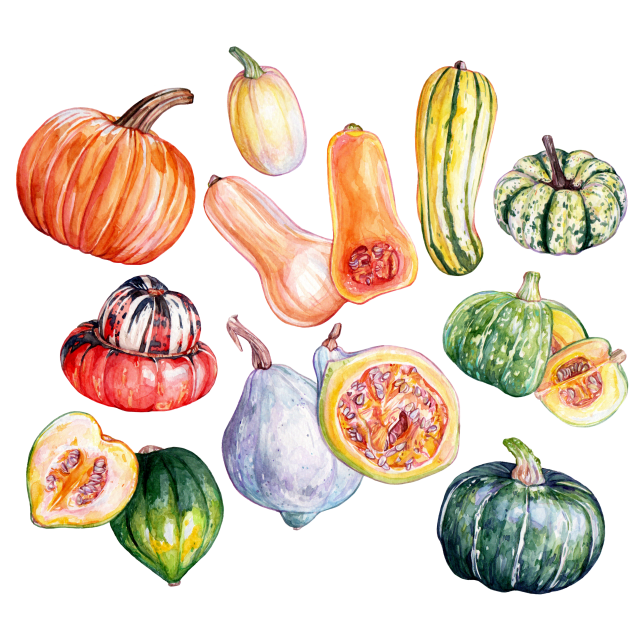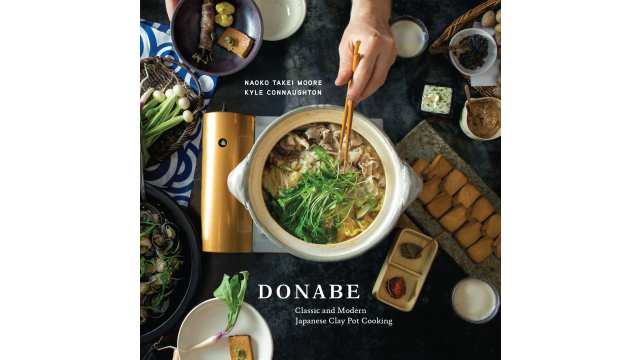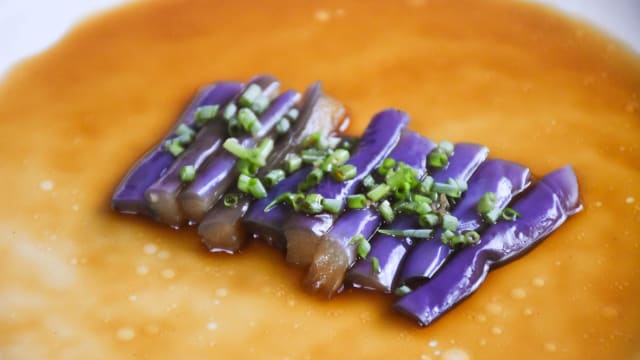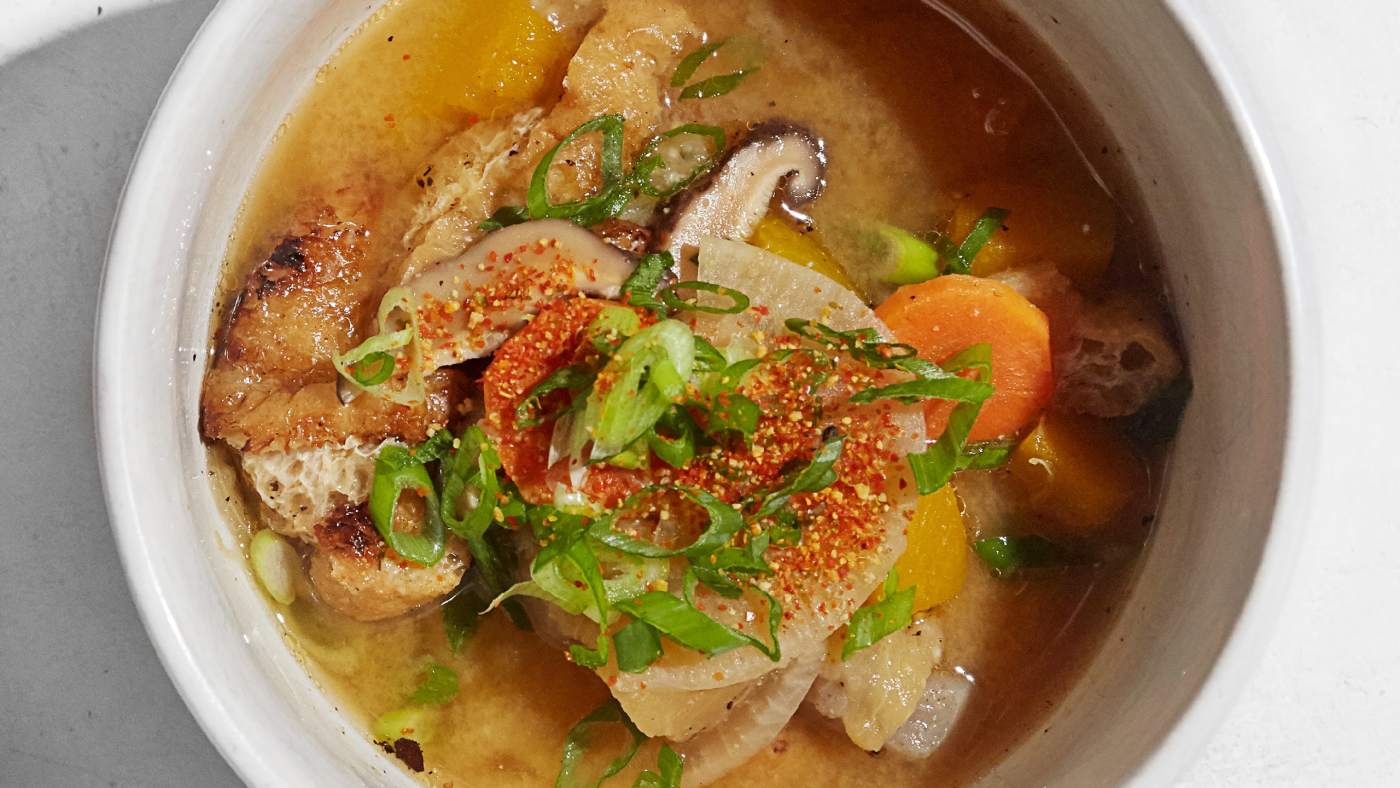
Kenchin Jiru

Kenchin Jiru
Description
Kenchin-jiru is a hearty one-pot vegetable miso soup from Buddhist temple cuisine, made with root vegetables, mushrooms, tofu and Kombu & Shiitake Mushroom Dashi (seaweed stock). Kenchin-jiru is packed with fiber, antioxidants, and essential vitamins. Miso supports digestion, konnyaku (a Japanese yam jelly) aids weight management, and vegetables boost immunity and promote gut health.
NOTE
If you don't have a donabe, you can use a heavy-bottomed pot.
Ingredients
4 SERVES
- 1 medium Japanese eggplant
- 1 rectangular abura-age (fried tofu pouch)
- 3 oz konnyaku (Japanese yam cake), torn into bite-size pieces by hand
- 1 Tbsp ( 15 ml) sesame oil
- 2 medium rehydrated dried shiitake mushrooms (from making Kombu & Shiitake Mushroom Dashi), cut into thin slices (optional)
- 3 oz (85 g) daikon, peeled and cut into 1/8-in (3-mm) thick disks and halved
- 2 Tbsp (30 ml) sake
- 3 1/3 cups (800 ml) Kombu & Shiitake Dashi or your choice of stock
- 1/4 medium kabocha, skin thinly peeled off, and cut into bite-size pieces
- 1/2 medium carrot, cut into 1/8-in (3-mm) thick disks
- 1/4 cup (73 g) red miso
- 1 or 2 tsp usukuchi shoyu (light-colored soy sauce)
- Thinly sliced scallions or chopped chives for garnish
- Shichimi togarashi to taste
Directions
-
Step 1
To prepare the eggplant, poke several holes with the tip of a knife on each eggplant. Set a grill on a stove top and grill them over medium-high heat. Rotate a few times so the eggplants cook evenly. Once they are partially charred and soft (it will take about 5 minutes), remove from the grill, cut off the hull of the stem and gently peel the skin. Cut each eggplant into bite-size pieces. Pat dry with a clean kitchen towel to remove any excess moisture. Set aside. -
Step 2
Place the abura-age on the same grill net and lightly grill both sides just until fragrant and lightly colored, about 1 minute. Cut into thin strips and set aside. -
Step 3
To prepare the soup, add the konnyaku to the donabe and set over medium heat. Sauté for a few minutes to release excess moisture (this will enhance the flavor and texture of the konnyaku). -
Step 4
Add the sesame oil, followed by the abura-age, shiitake mushrooms, and daikon. Continue to sauté for a minute or so. -
Step 5
Deglaze with the sake and pour in the dashi. Increase the heat to medium-high. As soon as the broth starts to boil, lower the heat to a simmer. Simmer for a few minutes. -
Step 6
Add the kabocha and carrot, and continue to simmer for about 5 minutes or until everything is cooked through. -
Step 7
Add the eggplant and stir. Gently whisk in the miso. Adjust the flavor with the usukuchi shoyu, if necessary. Turn off the heat. Let rest for a few minutes. -
Step 8
Serve into individual bowls and sprinkle with scallions and shichimi togarashi, if you like.
Explore Recipe Ingredients
About the author
More by Naoko Takei
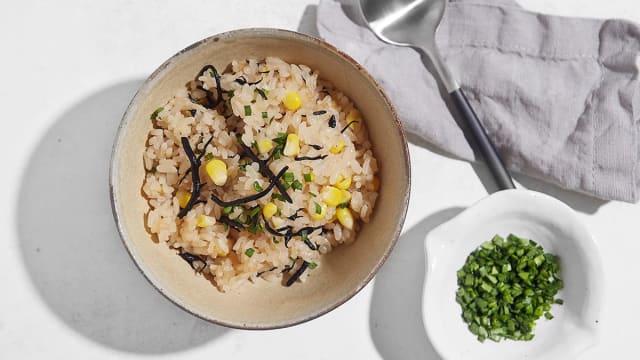
Corn & Hijiki Rice
Cooked in a traditional donabe (clay pot), this dish combines Japanese rice with fresh corn and the sea vegetable hijiki. Mineral-rich hijiki is reminiscent of carrot and burdock, and they’re often all simmered together in Japanese cooking. Juicy, sweet corn and the earth-meets-ocean flavor of hijiki are good together, especially with fluffy, warm, slightly sticky short-grain rice.

Kombu & Shiitake Mushroom Dashi
Use this kombu (seaweed) and shiitake mushroom dashi (or stock) in soups, stews, and hot pots — and for cooking rice, too. After the overnight infusion, the kombu and shiitake can be added to the water for a hot pot. When heated together with the other ingredients in the hot pot, the kombu and shiitake make for an even richer dashi. The shiitake also can be sliced (discard the stem) and cooked in a vegetable soup.

One Pot Cooking: Art of Donabe
Naoko Takei introduces you to the simple pleasures of cooking with a donabe.


